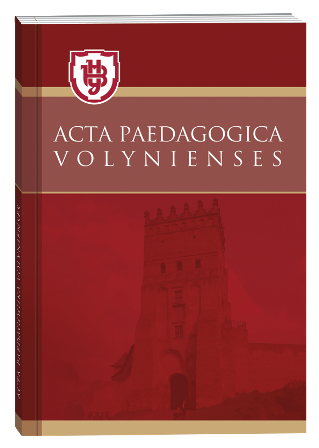FORMATION OF SOCIAL MATURITY IN FUTURE SPECIALISTS OF SPECIAL EDUCATION IN THE PROCESS OF EXTRA-INITIAL ACTIVITIES IN HIGH SCHOOLS
DOI:
https://doi.org/10.32782/apv/2023.6.9Keywords:
professional training, special education specialist, social maturity, social activity, university of the third age, extracurricular activities, elderly people, social inclusion. The article reveals the leading theoretical and practical aspects of the modern interpretation of the essence of social maturity of future specialists, criteria, indicators and technologies of its formationAbstract
The article reveals the leading theoretical and practical aspects of the modern interpretation of the essence of social maturity of future specialists, criteria, indicators and technologies of its formation. The factors of the importance of the formation of social maturity among future special education specialists in the process of their professional training in higher education institutions are substantiated: the requirement of readiness and ability to solve complex tasks and practical problems of special and inclusive education in the process of correctionalpedagogical, diagnostic-consultative and research activities with clients of various age groups; the complication of the range of professional functions and tasks in today’s conditions and the growing role of professional and personal qualities in their implementation and performance. The purpose of the article is to analyze the organizational and pedagogical conditions for the formation of social maturity among future special education specialists in the process of extracurricular work and to reveal the practical aspect of this issue on the example of their involvement in the activities of the University of the Third Age at the Ternopil Volodymyr Hnatyuk National Pedagogical University. The forms of social activity and interaction of students – future specialists in special education with subjects of the organization and ensuring the functioning of the university of the third age at higher education institutions are characterized; the organizational and pedagogical conditions for the formation of their social maturity are outlined: the awareness of numerous problems that take place in objective reality and the need for their theoretical understanding and practical solution not only in the process of future professional correctional-pedagogical, diagnostic, advisory and research activities, but also in the process professional training in higher education institutions; subject position, partnership interaction and reliance on the strengths of all participants involved in creating and ensuring the functioning of the university of the third age, as a significant factor in the social inclusion of the elderly; awareness of the need to combine and coordinate the demands and needs of society with personal desires, aspirations and social responsibility.
References
Вайнілович Н. Волонтерський рух у сучасному українському суспільстві: мотиваційний аспект. Методологія, теорія і практика соціологічного аналізу сучасного суспільства. 2015. № 2. C. 407–410.
Вієвська М. Соціальна відповідальність сучасного фахівця як підґрунтя його продуктивної професійної діяльності. Наука і освіта. 2015. № 9. С. 19–24.
Галета Я. Соціальна зрілість особистості в умовах оновлення інформаційної культури суспільства : монографія / Я. В. Галета. Харків : Мачулін, 2018. 392 с.
Горішна, Н., Слозанська, Г. (2023). Логопедичні послуги в Україні у час війни: результати крос-секційного дослідження. Спеціальна освіта та соціальна інклюзія: виклики ХХІ століття : матеріали ІІ Всеукраїнської науково-практичної конференції з міжнародною участю (м. Запоріжжя, 22 лист. 2023 р.). Запорізький національний університет, 50–52.
Добровіцька О. Волонтерство в інклюзивному середовищі як педагогічна умова підготовки до професійної діяльності соціальних працівників. Науковий вісник Ужгородського університету. Серія «Педагогіка. Соціальна робота». 2019. Випуск 1(44). С. 59–61.
Комар Т. Соціальна зрілість особистості як чинник становлення професійної зрілості психолога. Проблеми сучасної психології. 2016. Вип. 34. С. 200–210.
Крюкова О. Соціальна зрілість особистості у сучасних психологічних дослідженнях. Проблеми сучасної психології : збірник наукових праць Кам’янець-Подільського національного університету імені Іван Огієнка. 2010. Ч. 10. С. 345–353.
Меднікова Г. Соціальна зрілість: сутність і критерії. Вісник Харківського національного едагогічного університету імені Г. С. Сковороди. Психологія. 2012. Вип. 43. С. 179–186.
Радул В. Соціальна зрілість особистості: монографія / В. В. Радул. – Харків : Мачулін, 2017. 441 с.
Черкашин А. Особливості формування особистісно-професійної зрілості майбутніх фахівців у вищих навчальних закладах: теоретичний аспект. Теорія управління соціальними системами. 2018. Вип. 1. С. 3–13.







